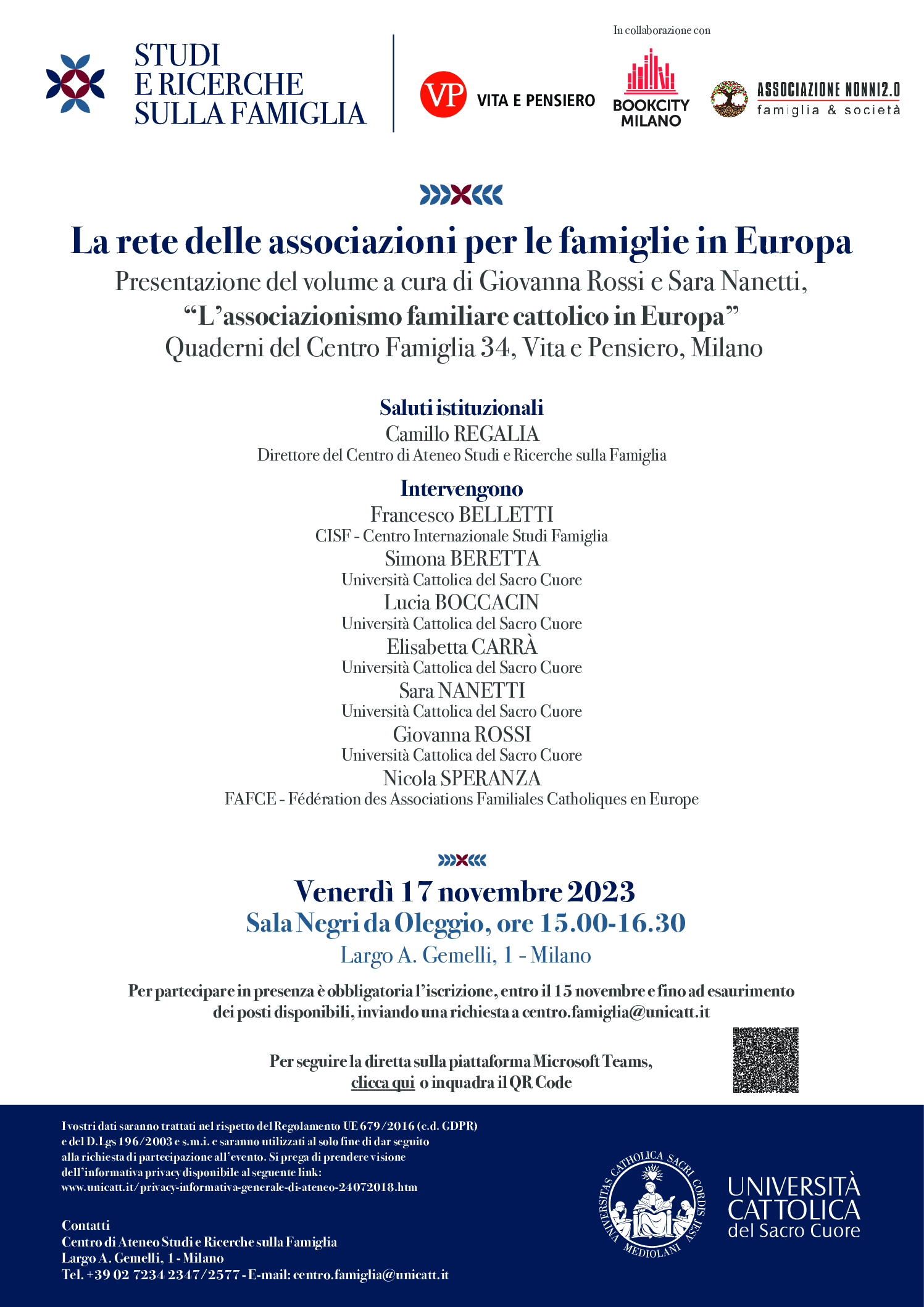Presentation of the volume edited by G. Rossi and S. Nanetti, “L’associazionismo familiare cattolico in Europa“, Quaderni del Centro Famiglia 34, Vita e Pensiero, Milan
Brussels, 17th of November
Today, 17 November 2023, at 3.00 p.m., the University Center for Family Studies and Research is organising an event entitled La rete delle associazioni per le famiglie in Europa (The network of associations for families in Europe), during which a new publication on Catholic family associations in Europe (“L’associazionismo familiare cattolico in Europa”, Quaderni del Centro Famiglia 34, Vita e Pensiero, Milan), edited by Giovanna Rossi and Sara Nanetti, will be presented.
The volume presents the results of a research project promoted by the University Center for Family Studies and Research in cooperation with Associazione Nonni 2.0 and the Federation of Catholic Family Associations in Europe (FAFCE) on family associations in Europe. The publication, with a foreword by Lucia Boccacin and contributions by Elisabetta Carrà, Francesco Belletti and Nicola Speranza, offers a comprehensive overview of the qualities of Catholic family associations in Europe, interweaving policy, the social doctrine of the Church and anthropological and sociological perspectives.
The study, involving the member associations of FAFCE through a survey, focused on the family dimension of associations in their structural and semantic organisation. Starting from a social context such as the European one, which is often subject to bureaucratic logics, the associative networks with a family character seem to have found a counter-intuitive space for action, bringing to the centre of the European public sphere the particular humanising relations marked by reciprocity, solidarity and gratuitousness, which are typical of family networks.
The data shows that the interest for which the various subjects have created an associative or organisational reality fall mainly in the area of rights. This means that the associations were mostly created to support the socio-political rights of the family (in eight cases). The proportion of associations created to meet the needs of member families is also significant (in four cases). More specific aspects such as the promotion of particular projects or the formalisation of studies and/or research seem to have had less incidence, as do the more general reasons of responding to widespread needs among members, or towards other people and the protection of rights. The focus on the socio-political dimension and on the needs of families enables us to place these associations properly within the sphere of family associations working for families from the point of view of their aims and guidelines.
The associations’ operational interest takes shape in a rather heterogeneous series of concrete support, promotion, information, and training actions. Information and training activities are the most widely practised and include the promotion of: events, conferences and/or meetings (in eleven cases), socio-educational activities (in ten cases), publishing projects (in eight cases), training and support actions (in seven cases), awareness-raising activities on gender issues and equal opportunities for men and women (in six cases) and meetings and courses for young people on responsible living and sexuality (in five cases). This is followed in variety and richness by promotional actions including cooperation with other bodies and associations (in seven cases), non-partisan political activity reporting malfunctions to the authorities and consultations with experts and specialists (in six cases).
There is a clear focus on young people and minors: in four cases through activities in schools, in three cases by promoting prevention actions for minors at risk and in two cases through the inclusion of young people and/or the integration of the disabled. Finally, the support actions, although the least practised, show a strong commitment to families, through specific measures to support families (in ten cases), a particular focus on mothers, through support for mothers and children (in seven cases) or support for pregnant women in need (in six cases).
The factors contributing to participation are first and foremost the sharing of plans and perspectives and the desire to be informed. But also specific orientations such as solidarity, the desire to tackle specific problems, the will to defend one’s own rights, participation and commitment. The individual’s urge to join an association also comes to terms with the shortcomings of the political system and the transformative aims assumed by associations.
On the basis of this comparison, the family model supported by the associative realities appears to be oriented primarily towards family agency, i.e. on the family organisation’s ability to shape and act in the social context. The families, that express themselves in the associations are able to generate a new public space. In contrast to the private model of typically modern family member, the organisations adopt an approach based on familiarisation of the social context by inserting themselves, like other public or private actors, into a space open to interaction and cooperation for the realisation of a common good.
From an operational point of view, the openness to the public sphere is evident in the organisation of the political-social representation of members, which is mainly linked to the interests, needs and experience of the organisation’s members, which in turn highlights the close relationship between the pro-social aspects inherent in the family structure and the civic-political openness of third sector organisations in the public context. The predicament in which the families that make up the various organisations find themselves is reflected in the associative dimension in the willingness to act together to find a response at various levels.







